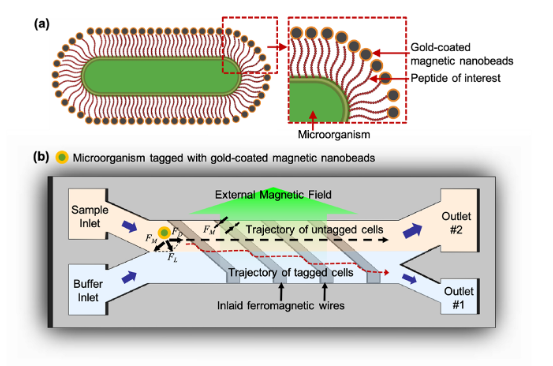Synthetic Biology and Biomanufacturing
Synthetic biology is an interdisciplinary field that aims to engineer biological systems for useful purposes. In our lab, we have been working on developing high-throughput microfluidic systems approaches to accelerate R&D processes in synthetic biology and biotechnology. These include applications in microbial bioproduction (such as biofuel), microbial bioremediation (such as plastic degradation), and developing new hybrid “living” materials.
Topics
Microalgae Biofuel
Developing and utilizing high-throughput single-cell-resolution droplet microfluidic systems for characterizing/enriching the most efficient microalgae variant for high productivity.

Selected Project/Publications
- A High-Throughput Droplet Microfluidics Screening Platform for Selecting Fast Growing and High Lipid Producing Microalgae from a Mutant Library
H. S. Kim, S. –C. Hsu, S. –I. Han, H. R. Thapa, A. R. Guzman, D. R. Browne, M. Tatli, T. P. Devarenne, D. B. Stern, and A. Han,
Plant Direct, Vol. 1 (3), pp. 1-13 (2017) - A Droplet Microfluidics Platform for Rapid Microalgal Growth and Oil Production Analysis
H. S. Kim, A. R. Guzman, H. R. Thapa, T. P. Devarenne, and A. Han,
Biotechnology and Bioengineering, Vol. 113 (8), pp. 1691-1701 (2016). Published as Front Cover. - A High-Throughput Microfluidic Single-Cell Screening Platform Capable of Selective Cell Extraction
H. Kim, T. P. Devarenne, and A. Han,
Lab on a Chip, Vol. 15, pp. 2467-2475 (2015) - A Microfluidic Photobioreactor Array Demonstrating High-Throughput Screening for Microalgal Oil Production
H. S. Kim, T. L. Weiss, H. R. Thapa, T. P. Devarenne, and A. Han,
Lab on a Chip, Vol. 14 (8), pp. 1379-1482 (2014). Published as Front Cover. Selected as an Lab on a Chip HOT Article.
New Hybrid “living” Material
Utilizing the power of microfluidic screening systems to identify engineered microorganisms that have unique capabilities, such as selectively binding to target materials of interest. The selected microorganisms can then be utilized to develop hybrid “living” materials.

Selected Project/Publications
- Identification of Microorganisms that Bind Specifically to Target Materials of Interest Using a Magnetophoretic Microfluidic Platform
Song-I Han, Deborah A Sarkes, Margaret M Hurley, Rebecca Renberg, Can Huang, Yuwen Li, Justin P Jahnke, James J Sumner, Dimitra N Stratis-Cullum, and Arum Han,
ACS Applied Materials & Interfaces, Vol. 15 (9), pp. 11391-11402 (2023) - Discovery of Targeted Material Binding Microorganisms using a Centrifugal Microfluidic Platform
S. -I. Han*, D. A. Sarkes*, J. P. Jahnke, M. M. Hurley, V. M. Ugaz, R. Renberg, J. J. Sumner, D. N. Stratis-Cullum, and A. Han (*these authors contributed equally),
Advanced Materials Technologies, Vol. 6, 2100282 (2021) - Integration of electrochemical impedance spectroscopy and microfluidics for investigating microbially influenced corrosion using co-culture biofilms
SP Kotu, C Erbay, N Sobahi, A Han, S Mannan, and A Jayaraman,
NACE CORROSION, NACE-2016-7793
